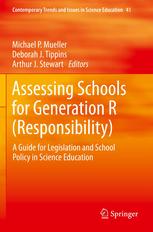

Most ebook files are in PDF format, so you can easily read them using various software such as Foxit Reader or directly on the Google Chrome browser.
Some ebook files are released by publishers in other formats such as .awz, .mobi, .epub, .fb2, etc. You may need to install specific software to read these formats on mobile/PC, such as Calibre.
Please read the tutorial at this link: https://ebookbell.com/faq
We offer FREE conversion to the popular formats you request; however, this may take some time. Therefore, right after payment, please email us, and we will try to provide the service as quickly as possible.
For some exceptional file formats or broken links (if any), please refrain from opening any disputes. Instead, email us first, and we will try to assist within a maximum of 6 hours.
EbookBell Team

4.1
70 reviewsToday’s youth will face global environmental changes, as well as complex personal and social challenges. To address these issues this collection of essays provides vital insights on how science education can be designed to better engage students and help them solve important problems in the world around them.
Assessing Schools for Generation R (Responsibility) includes theories, research, and practices for envisioning how science and environmental education can promote personal, social, and civic responsibility. It brings together inspiring stories, creative practices, and theoretical work to make the case that science education can be reformed so that students learn to meaningfully apply the concepts they learn in science classes across America and grow into civically engaged citizens. The book calls for a curriculum that equips students with the knowledge, skills, attitudes and values to confront the complex and often ill-defined socioscientific issues of daily life.
The authors are all experienced educators and top experts in the fields of science and environmental education, ecology, experiential education, educational philosophy, policy and history. They examine what has to happen in the domains of teacher preparation and public education to effect a transition of the youth of America.
This exciting, informative, sophisticated and sometimes provocative book will stimulate much debate about the future direction of science education in America, and the rest of the world. It is ideal reading for all school superintendents, deans, faculty, and policymakers looking for a way to implement a curriculum that helps builds students into responsible and engaged citizens.